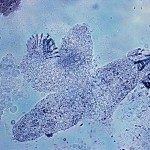Our inter-disciplinary team bring together diverse skill sets spanning mathematical modelling and statistics, molecular and serological assays, and the implementation of field-based epidemiological studies and clinical trials. We aim to use these tools to develop novel diagnostics for multiple infectious diseases ranging from malaria to SARS-CoV-2.
Some of our key projects are:
MultiSeroSurv: Algorithms and Multiplex Assays for Integrated Serological Surveillance of Malaria and Neglected Tropical Diseases
MultiSeroSurv is supported by an ERC Starting Grant (852373) to Dr Michael White and aims to develop multiplex serological assays for measuring antibodies to malaria and neglected tropical diseases. These assays are being applied to samples from longitudinal cohort studies from locations such as Senegal to provide an in-depth investigation of the kinetics of the antibody response to parasitic infections.
VISPA: P. vivax Serology for Elimination Partnership
VISPA is a collaborative partnership funded by The Bill & Melinda Gates Foundation and led by Prof Ivo Mueller (Walter & Eliza Hall Institute, Australia) and Prof Chris Drakeley (London School of Hygiene & Tropical Medicine, UK), aiming to accelerate the development of serological diagnostics for P. vivax malaria.
- Development and validation of serological markers for detecting recent exposure to Plasmodium vivax infection. Nat Med. 2020; 26(5): 741-749
PvSTATEM: P. vivax Serological Testing and Treatment: From a Cluster-Randomised Trial in Ethiopia and Madagascar to a Mobile-Technology Supported Intervention
PvSTATEM is a Horizon Europe supported project (101057665) co-directed by Dr Michael White and Prof Chris Drakeley (London School of Hygiene & Tropical Medicine, UK) aiming to implement a Cluster-Randomised Trial in Ethiopia and Madagascar to demonstrate the effectiveness of a new anti-malaria intervention based on Plasmodium vivax serological testing and treatment (PvSeroTAT) with primaquine to prevent the relapse infections responsible for maintaining P. vivax transmission. Simultaneously, we will assess social and health system acceptability of such an approach as well as refine new mobile technologies which interface with point-of-care diagnostic tests and guide treatment decisions.
- Developing sero-diagnostic tests to facilitate Plasmodium vivax Serological Test-and-Treat approaches: balancing public health impact and overtreatment. BMC Medicine. 2022; 20(1):98
Mathematical Modelling of P. vivax Transmission
Our team have extended the Ross-Macdonald models to account for the relapse infections characteristic of P. vivax. Having developed a theoretical basis for modelling P. vivax transmission, we have subsequently developed an individual-based simulation model capable of assessing the impact of malaria control interventions, extensively calibrated to multiple epidemiological data sets from Papua New Guinea, Brazil, and other P. vivax endemic countries. We are open to collaborations with other groups wishing to assess the potential impact of malaria control interventions. This work is supported by The Bill & Melinda Gates Foundation.
- Estimated impact of tafenoquine for Plasmodium vivax control and elimination in Brazil: A modelling study. PLOS Med. 2021; 18(4): e1003535.
- Mathematical modelling of the impact of expanding levels of malaria control interventions on Plasmodium vivax. Nature Commun. 2018; 9(1):3300.
High-throughput Multi-pathogen Serological Assays
Our laboratory team, with the support of collaborators, have developed multiplex serological assays for measuring antibodies to multiple antigens for a wide range of pathogens including malaria, neglected tropical diseases, arboviruses, and coronaviruses. The recent installation of the Luminex Intelliflex system is allowing us to scale up the number of pathogens that we can test for. This work is supported by LabEx Integrative Biology of Emerging Infectious Diseases (IBEID) and Institut Convergence for the study of Emergence of Pathology Through Individuals and Populations (INCEPTION).
- Development and validation of serological markers for detecting recent exposure to Plasmodium vivax infection. Nat Med. 2020; 26(5): 741-749
- Multiplex assays for the identification of serological signatures of SARS-CoV-2 infection: an antibody-based diagnostic and machine learning study. Lancet Microbe. 2020; 2(2): E60-E69.
Mathematical Modelling of Antibody Kinetics
Pharmacokinetic/Pharmacodynamics (Pk/Pd) models are used extensively to analyze how drug concentrations change over time and vary within populations. We have developed comparable methods for modelling the kinetics and dynamics of naturally-acquired and vaccine-induced antibody responses. These methods have been used to study antibody kinetics following vaccination against malaria or meningitis A, and following infection with SARS-CoV-2.
- Kinetics of the SARS-CoV-2 antibody response and serological estimation of time since infection. J Inf Dis. 2021; 224(9): 1489-1499
- Antibody kinetics following vaccination with MenAfriVac and implications for the duration of protection: an analysis of serological data. Lancet Inf Dis. 2019; 19(3):327-336.
- Immunogenicity of the RTS,S/AS01 malaria vaccine and implications for duration of vaccine efficacy: secondary analysis of data from a phase 3 randomised controlled trial. Lancet Inf Dis. 2015; 15(12):1450-8.











